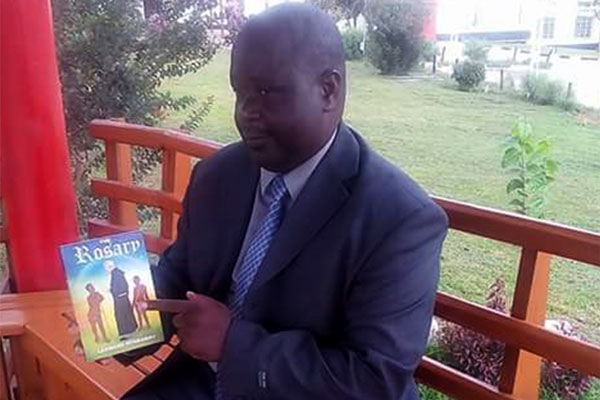
Title: The Rosary Author: Leonard Nyakabau ISBN: 978-0-7974-7728-5 Publisher: Royalty Books (2017)
THE Rosary is a very dense read that reminds me of reading Dambudzo Marechera. But Marechera is from a totally different planet and so is Nyakabau. It shall take time before Marechera’s levels are matched.
REVIEWED BY BENIAH MUNENGWA

The Rosary, a first time publication from Leonard Nyakabau, is a narration of a tale that captures the history of the Ngondi Kingdom (1920) in a period that the white men’s dark cloud started forming over the Zimbabwean landscape. But that’s not the way in which Nyakabau outlines it. He settles for the point of view that beautifies everything white and darkens everything black. His attempt to rejuvenate the African historical narratives, consequently, collapses as he fails to push the African man’s position in world egos forward.
It goes back to times before we knew we would be born, awakening nostalgic elements of a world that we never lived in and would never wish to live in, especially when the best purpose I would have served would have had been to please the white man. Nyakabau narrates the fictional vigil diary of a white man, who was a Catholic priest in this period somewhere in this country. Though fictional, the text tends to mention Mbuya Nehanda and Sekuru Kaguvi and the Ndebele raids on the Shona people.
Scenes of black men bootlicking Father Daniels crowd the narrations whilst Pesai, who’s the antagonist in this narrative, is overtly vilified throughout the text. Yet, Marshall and Toby’s confiscation of Chief Gwarada’s herd of two hundred and fifty cattle is portrayed in a way that leaves the white man’s hands sins a lesser evil than those of Pesai.
Father Daniel’s name is associated with all the good deeds in the text. From the spreading of the so called “enlightenment” to the delivering of the new religion with the ultimate agenda to bring change into the native land, the black man’s pride is eroded. Just like on the cover page, it’s the white man who’s giving instructions, being surrounded by the typical “black savages”, with no other intention than to take instructions, sympathise and follow the white man.
It is an orgy of the Zimbabwean man’s predilection to violence even against those of his own tribe, clan or village. This makes the novel a slow and dense read, but is it worth it? The reader can always find out.
- Chamisa under fire over US$120K donation
- Mavhunga puts DeMbare into Chibuku quarterfinals
- Pension funds bet on Cabora Bassa oilfields
- Councils defy govt fire tender directive
Keep Reading
Multiple characters are introduced into the narrative, but I felt they tended to overcrowd the story. They would have served the purpose of pushing the story forward if they were fewer and given time to develop as the narrative progressed. The long, ancient names, while perhaps reflecting the period covered by the text, are likely to put off some readers.
A writer must have a taste and a wit that picks on the best parts that enhance a story. While Nyakabau may be forgiven as a debutant novelist, Zimbabwe has a long tradition of highly polished debut novels including Shimmer Chinodya’s Dew in the Morning (1982) and Chenjerai Hove’s Up in Arms (1982).
Unlike the other writers, Nyakabau started writing late in his life so he has a large chunk of content to cover up.
And wait, want to learn about using descriptive language and intellectual dialogue, go find the book and if not, find his next book, The Assignment which I guess shall be a better one than this one. Although, the conversation is mostly technical, overly flowery, and intellectual and mostly unchanged, it, remains the major strength of the text though it was over used. Will you view this book in the same light as me, that’s the good part about reading on your own?
The title suggests influences of the Roman Catholic Church, of which Father Daniel is the face, in Ngondi land. This is likely what influenced the title of the book given the reverence that Catholics show to the rosary.
The author must be commended for coming up with this “old world” literary effort as there are hardly many texts in this genre written in English outside history. The Rosary was, therefore, not a waste of ink and paper.











